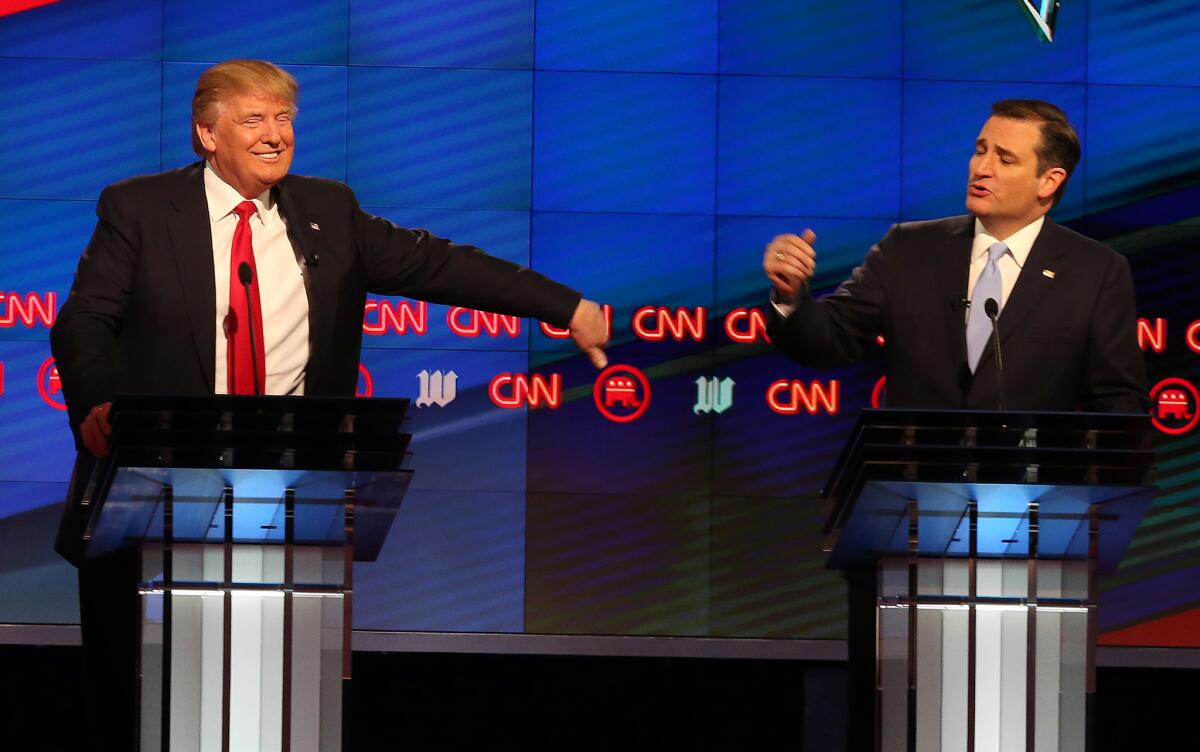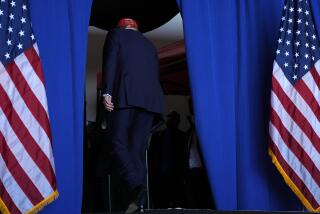Opinion: Why a brokered GOP convention would be bad news for both Trump <i>and</i> Cruz

History will not favor Donald Trump, left, or Ted Cruz if either wins the Republican presidential nomination in a brokered convention.
- Share via
The main reason Donald Trump doesn’t want to face a brokered Republican convention is the very real risk that the nomination might slip away from him. Trump has warned of riots if he loses the nomination despite being the top delegate-winner (note to The Donald: If you don’t have 50%-plus one of the delegates, you haven’t won). More recently, one of Trump’s top consigliores -- the New Yorker’s Evan Osnos’ term -- threatened to “disclose the hotels and the room numbers of those delegates who are directly involved in the steal” and urge voters “to visit their hotel and find them. You have a right to discuss this.”
Nice threat, that. Trump’s chief surviving rival, Ted Cruz, has also warned of a voter “revolt” if no one wins the nod on the first ballot and a compromise nominee is perceived to have been hand-picked by the party leaders.
So the jockeying continues, with varying degrees of ominous silliness. But a deeper problem may face whoever emerges from a brokered convention: Multi-ballot nominees have historically been trounced in the general election. According to the Pew Research Center:
“We looked at all 60 Democratic and Republican nominating conventions from 1868 (the first post-Civil War election) to 1984, the last time a convention presented even a glimmer of uncertainty. Over that time, 18 candidates (eight Republicans and 10 Democrats) were nominated on multiple ballots; of those, only seven were elected president (and four of them were running against another multiple-ballot nominee, so one of them had to win).”
Why such a low success rate? This is a bit speculative, but as Pew pointed out, brokered conventions suggest deep divisions within a political party reflected in candidates who represent “a different geographical or ideological faction of the party, [and] who were closely matched in strength.” In the current cycle, geography isn’t the issue. It’s primarily ideology, driven by voters trying to move the already conservative party even further to the right.
While neither Trump nor Cruz has accumulated a majority of support among Republican voters, each is a political outsider in his own way, Trump being less ideological than Cruz. Together they draw over 70% support in the most recent aggregate polling, while other candidates generally perceived to have been favored by the party leadership have all gone home save John Kasich, who is polling at only 20%. Even in late February, when Marco Rubio, Jeb Bush and Ben Carson were still in the race, Trump and Cruz -- the outsiders -- drew a combined 52% support among GOP voters.
If neither Trump nor Cruz wins enough delegates to avoid a brokered convention, the post-convention Republican Party could look a lot like Humpty Dumpty after he tumbled off the wall.
Follow Scott Martelle on Twitter @smartelle.
More to Read
A cure for the common opinion
Get thought-provoking perspectives with our weekly newsletter.
You may occasionally receive promotional content from the Los Angeles Times.







